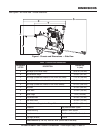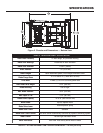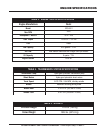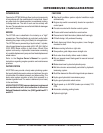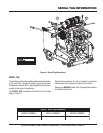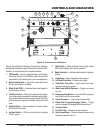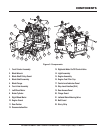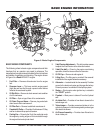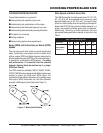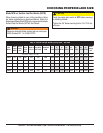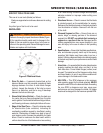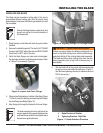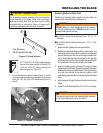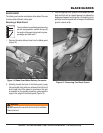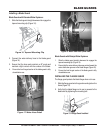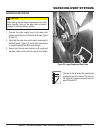
SP7060 PAVEMENT SAW • OPERATION MANUAL — REV. #0 (02/13/09) — PAGE 23
CHOOSING PROPER BLADE SIZE
CHOOSING PROPER BLADE SIZE
Proper blade selection is a product of:
■
Understanding the capability of your saw
■
Understanding the specifications of the engine
■
Understanding the blade shaft speed of your saw
■
Understanding diamond blade operating limitations
■
The depth of cut required
■
Cutting conditions
■
Desired cutting performance requirements
Engine (RPM) and Surface Feet per Minute (SFPM)
Speeds
This saw uses a belt drive system to propel the diamond
blade. Specifically sized engine drive and blade shaft
pulleys, engine (RPM) and blade diameter determine the
ultimate peripheral speed (SFPM) of the diamond blade. It
is important to understand the SFPM speed — For safety
and performance, it is essential that the selected
diameter diamond blade be matched up to a proper
SFPM (see Table 8).
Five 7060 models are available (706016, 706020, 706026,
706030, 706036) and are designed with different pulley ratio
speeds to govern the blade shaft RPM output. The
combination of the different diameters of the pulleys along
with engine (RPM) determines this ratio that ultimately
provides a RPM speed at the blade shaft (Figure 7).
Figure 7. Blade Shaft Ratios
Ratio Speeds and Blade Guard Size
The 7060 Series offer five blade guard sizes (16", 20", 26",
30", 36") that will accommodate most commonly used
diamond blades up to a 36" (914 mm). The series further
offers four distinct pulley ratio set-ups that provide specific
blade shaft RPM. Pairing a diamond blade diameter to a
proper ratio speed and blade guard size is imperative.
Additionally, matching up blade diameters with the
appropriate blade guard size is equally as important. See
Table 7.
trahCgniziSdrauGedalB.7elbaT
drauGedalB"61"02"62"03"63
edalBdnomaiD
).ni(retemaiD
"41"61"42"42"62
"61"81"62"62"03
"02"03"6
3



